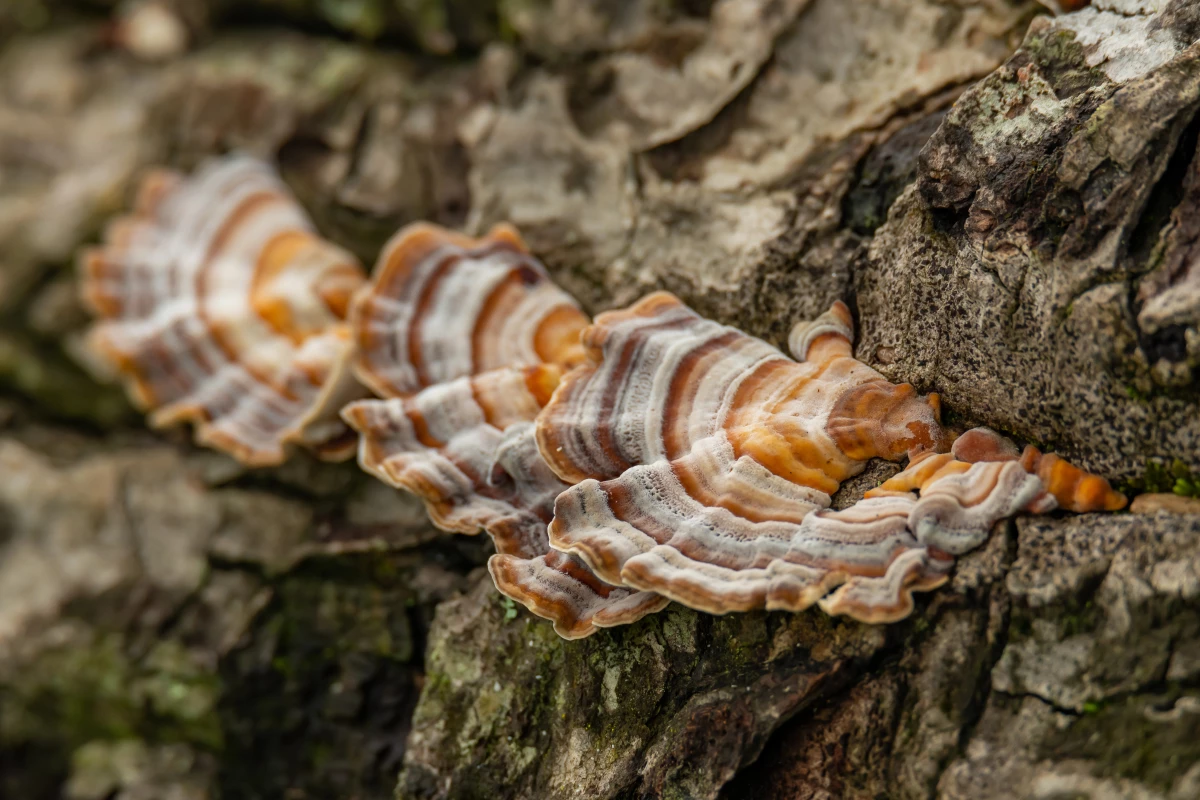Science
Turkey Tail Mushroom Offers Sustainable Alternative to Plastic Wrap

Researchers at the University of Maine have developed a sustainable alternative to single-use plastic wrap using the edible turkey tail mushroom and wood fibers. Their study reveals that a natural waterproof coating can effectively replace synthetic materials used in food packaging and paper cups. This innovative approach aims to reduce reliance on plastics and minimize environmental waste.
The study’s authors focused on creating a food-safe coating that effectively resists water, oil, and grease. They experimented with the mycelium, a root-like structure from the turkey tail mushroom (Trametes versicolor), which forms a dense network of waterproof strands. By combining this mycelium with nanofibrils—tiny wood cellulose fibers commonly used in papermaking—the researchers produced a surface that is both oxygen- and grease-proof.
Assoc. Prof. Caitlin Howell, the corresponding author of the study, stated, “Our hope is that by providing more ways to potentially reduce our reliance on single-use plastics, we can help lessen the waste that ends up in landfills and the ocean; nature offers elegant, sustainable solutions to help us get there.”
The fungi-based coating was applied in thin layers to various materials, including paper, denim, polyester felt, and birch wood veneer. After drying in an oven for a day, the team observed that the coating created an effective waterproof barrier, comparable to a layer of paint. By the fourth day, distinct yellow, orange, or tan markings appeared on the surface. Tests showed that water droplets placed on the coated materials formed into beads, while droplets on untreated surfaces spread out or were absorbed.
In addition to water resistance, the coating demonstrated effectiveness against other liquids, including n-heptane, toluene, and castor oil. This suggests that the mycelium-based coating holds promise as a versatile barrier against various substances.
The growing interest in mycelium-based products extends beyond food packaging. Experimental applications in building construction are emerging, such as tiles made from oyster mushrooms and bamboo scraps, developed by scientists at Nanyang Technological University in Singapore. These tiles, which feature a bumpy surface resembling elephant skin, are designed to improve energy efficiency and maintain comfortable temperatures in buildings.
Another innovative product, mycocrete, is being developed at Newcastle University in the United Kingdom. This concrete alternative combines mycelium with grains and other materials to create a sustainable building material.
The findings from the University of Maine were recently published in the journal Langmuir, highlighting the potential of natural materials in addressing environmental challenges. As more researchers explore sustainable solutions, the combination of fungi and wood fibers may pave the way for innovative alternatives to conventional plastics.
-

 Science4 weeks ago
Science4 weeks agoInventor Achieves Breakthrough with 2 Billion FPS Laser Video
-

 Health1 month ago
Health1 month agoCommunity Unites for 7th Annual Into the Light Walk for Mental Health
-

 Top Stories1 month ago
Top Stories1 month agoCharlie Sheen’s New Romance: ‘Glowing’ with Younger Partner
-

 Entertainment1 month ago
Entertainment1 month agoDua Lipa Aces GCSE Spanish, Sparks Super Bowl Buzz with Fans
-

 Business1 month ago
Business1 month agoTyler Technologies Set to Reveal Q3 Earnings on October 22
-

 Entertainment1 month ago
Entertainment1 month agoMother Fights to Reunite with Children After Kidnapping in New Drama
-

 World1 month ago
World1 month agoR&B Icon D’Angelo Dies at 51, Leaving Lasting Legacy
-

 Health1 month ago
Health1 month agoCurium Group, PeptiDream, and PDRadiopharma Launch Key Cancer Trial
-

 Entertainment1 month ago
Entertainment1 month agoRed Sox’s Bregman to Become Free Agent; Tigers Commit to Skubal
-

 Science1 month ago
Science1 month agoNorth Carolina’s Biotech Boom: Billions Invested in Manufacturing
-

 Health1 month ago
Health1 month agoNorth Carolina’s Biotech Boom: Billions in New Investments
-

 Top Stories1 month ago
Top Stories1 month agoDisney+ Launches Chilling Classic ‘Something Wicked’ Just in Time for October









